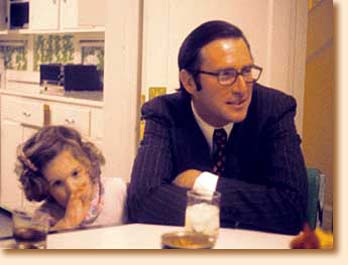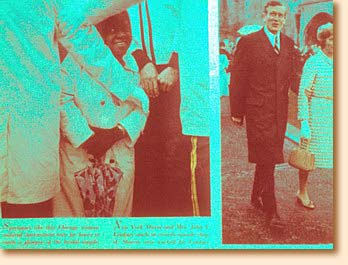|
Important afterthoughts:
These were my harsh words in the original book - one reason I
cannot today stand reading the book, which in its words was so much a product
of its time. This I was again reminded of many years after when a beautiful
white woman came up to me after my 10th showing of American
Pictures in Stanford University. She asked to talk with me under
four eyes and we walked over to a quiet corner, where she suddenly
burst out: "I
am in your book!"
My mind was racing fast, for who could she really be? There
are so few pictures of whites in my book. Then she showed me this
page in the book and explained that she was this little girl -
sitting there in her mother's lap - who had now grown up to be 21
years old. And then Valerie continued:
"Last year when my roommate came home from your show and told me
that you portrayed my father as an alcoholic (which he certainly
is not) and even a murderer, I was very upset with you. But now
when I have seen your show and have been deeply moved by it and
its message, I can see what it is you want to say and that you are
not out to personally attack my family. You are only using it as
symbols to try to show the deeper social problems in our society.
That effort I can only whole-heartedly support, so here is my card
if you ever need any help."
|

Valerie in one of my
more loving pictures of her father. |
Then she gave me a big warm hug and left.
I was both in shock and
deeply relieved. I had been deeply hurt the first year of my
lecturing when an older woman in Denmark had walked out from my show in
"protest against the way you portray the Rockefellers." For I had
never been out to attack anybody personally and the whites in my
show had all remained my lifelong friends - exactly because they
could easily see that it was not about them as individuals.
And still I was not surprised to see Valerie's reaction. For by
then I had toured for years in Ivy League universities and it was
exactly the same reaction I had seen five times earlier from other
children of the Rockefeller family - a family which obviously puts
enormous emphasis on bringing its children up to take a strong involvement in social issues.
This claim could of course easily be taken as merely the official empty
words of pride and self prize in an affluent family trying to
justify it's affluence. But since I know how difficult my show is
to sit through for ALL Americans - being under attack for 5 hours - very
few have like me had such a good chance to actually test the Rockefellers on
the depth of their social commitment.
|

The photo in LIFE Magazine of a trapped black woman trying
to get a
glimpse of Jay's and Sharon's wedding - the story which - apart
from Nelson Rockefeller's recent bloody attack on the
Attica prisoners - had very much inspired the angry tone
in my
original story about Valerie's famous parents. |
For security reasons most of them lived anonymously on
campus - when they opened up to me - and I my conversation
with them was confidential. So let me just here say that two of the Rockefeller sons
- individually of each other - had long talks with me
afterwards about how they could put money into American Pictures
or help the people portrayed in it. Unfortunately I was too busy
at the time to take them up on their words, but I learned here
that their commitment to social causes was far stronger than
their commitment to their family name which I had so vulgarly
attacked. It helped reinforce the
conclusions I had previously reached about many of the super-rich
which you
will see later in this book.
|